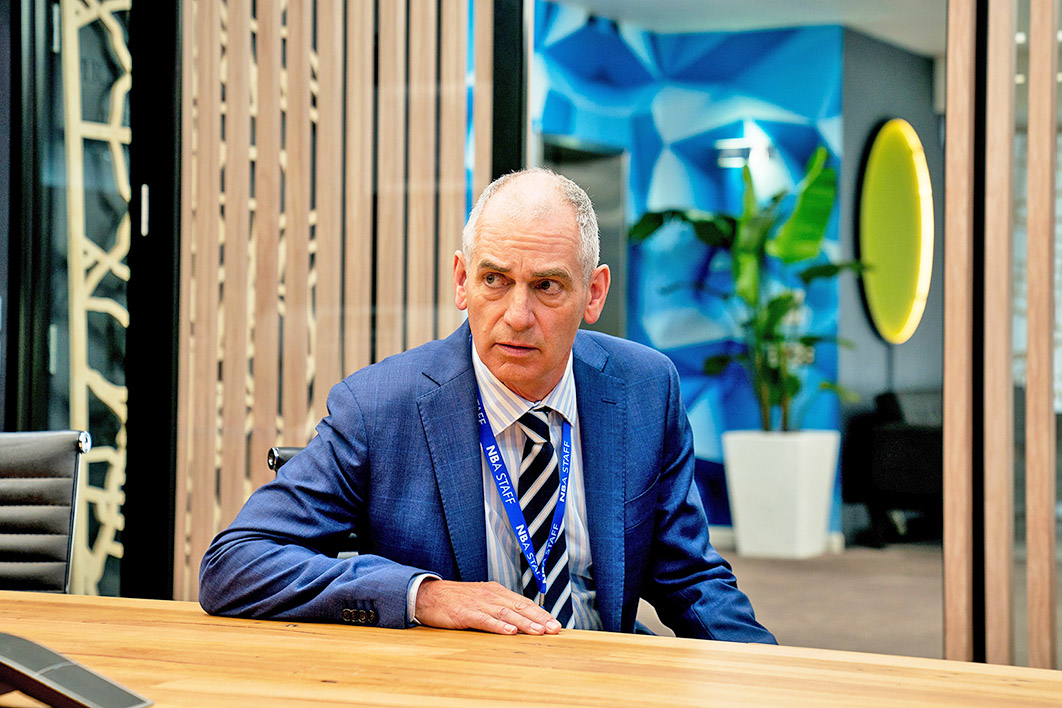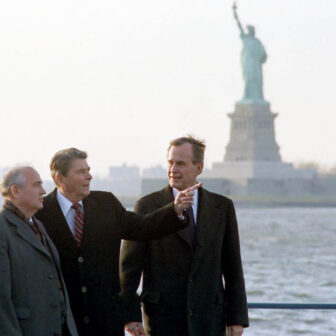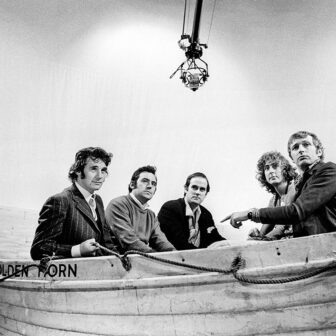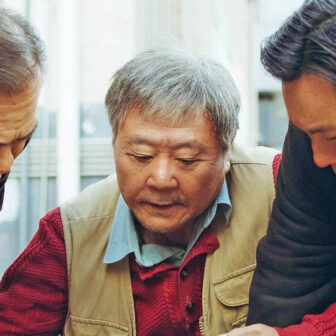“It is, above all (or beneath all), about daily humiliations,” Studs Terkel wrote in his introduction to Working, his 1974 oral history of jobs and the people who do them. The book hasn’t been out of print in half a century, and I wonder if the creative team behind ABC’s Utopia have been reading it. As the hit comedy series commences its fifth season, I detect a shift in tone.
Central character Tony Woodford (Rob Sitch), hapless CEO of the Nation Building Authority, is enduring a pile-on of humiliations. These range from the trivial, when the office’s new smart fridge turns his lunch into an iceblock, to the overwhelming, when he cops the blame, in a spray of media coverage, for an aborted scheme whose failure was caused by a website malfunction. Then, when the tables are turned and he’s featured in a glossy magazine shoot in the following episode, even that turns out to be a demeaning experience.
The creation of Sitch and his Working Dog collaborators Santo Cilauro and Tom Gleisner, this sophisticated satire on contemporary working life has always had a ruthless edge, but now an element of melancholy seems to have got into the mix. The resilient Tony, whose capacity to keep calm and carry on while all around him goes haywire, is looking older and more at risk of being beaten down.
Chirpy personal assistant Katie (Emma-Louise Wilson) replaces his coffee with chamomile tea and freezes his computer by changing the wallpaper to soothing pastels. The more assiduously the rest of the staff go about their work, the more difficult it is to get anything done. This is the essential comedic principle of the series, and in previous seasons it generated a mesh of finely crafted absurdities as everyone engaged in their own specialised form of obstruction.
The new season kicks off with a typically ludicrous example: the matter of a farewell tea for a staff member. The guy has only been around for a year and is moving on to another position, so there are no complications, at least until HR goes about the business of finding them. The crisply spoken Beverley (Rebecca Massey) sails into Tony’s office with a spring in her step and a glint in her eye to raise a few questions. His idea of a jocular impromptu speech won’t do — he must submit a draft for checking. Word-by-word vetting ensues in consultation with the legal team, and that’s not the end of it.
Workplace health and safety, media briefings, team-building requirements, liability concerns, contractual technicalities: it’s more than a full-time job serving the dictates. Yet it’s clear that many of Tony’s colleagues delight in shuttling between imperatives and embargos, implementing rules and protocols that not only defy common sense but also render it an impossibility.
This season is not as exuberantly crazy as its predecessors. Workplace pathologies are viewed with a steadier gaze, prompting questions less about the politics of the situation (this is, after all, an organisation that functions at the behest of government) and more about the shame of so avidly thwarting human intelligence at every turn. Perhaps, fundamentally, the humiliation lies in the time wasted — which can be a lot given that most of us, as Terkel observes, spend more time working than doing anything else.
Terkel, who strove to bridge the communication gap between working people and those who make the decisions that affect their lives, once suggested that any American president delivering the Labor Day address might count themselves fortunate to be spared an encounter with the spot-welder, the washroom attendant or the cleaner whose stories he recorded.
The forty-fourth president, Barack Obama, has a different sense of being fortunate. Released from the work schedules of the Oval Office he went in search of workers across the spectrum for a four-part Netflix series, Working: What We Do All Day. He serves as executive producer and narrator as well as engaging the subjects in conversation, following them into their workplaces and their homes. Terkel’s study, which he came across as a student, is his inspiration.
“What if we pick up Studs’s project for this era?” he proposes. “What if we start at the bottom and work our way up, from the service entrance to the C suite; what would it tell us about how we’re connected, about our own place in the world?” He looks at how the economic hierarchy plays out in the industries of home care, technology and hospitality in three different locations: Manhattan, Mississippi and Pittsburgh.
With this focus on connection, directing attention to the human in the role, Obama flips the humiliations theme in Terkel’s account and offers the other side of the coin from what we see in Utopia. Wry, incisive and with a personal warmth no generic training could spoil, Obama is in many ways the perfect guide. He clearly has spontaneous liking for the people (“folks,” as he prefers to say) he’s engaging with.
When he goes round the supermarket with a home care worker, he wheels the trolley with her toddler perched in the seat. As they talk, the questions about wages and costs, aims and barriers, wishes and disappointments come across as a private conversation rather than interview material. When the second episode opens he is delivering lunches to office staff at their desks — potentially the kind of appalling idea Utopia’s media manager Rhonda (Kitty Flanagan) might come up with, but it’s hard to detect a shred of pretence or image-consciousness in his manner.
Obama has been justifiably criticised for going too easy on the bosses in the series, choosing businesses that are the exception rather than the rule in their considerate attitudes to those they employ, and for generally being too relaxed and bland about working conditions. Humorous he may be, but there’s not a skerrick of cynicism here. After all, President 44 was the Hope guy, the “Yes We Can” campaigner. It’s also arguable, though, that his ease of manner encourages people to open up and offer personal reflections only elicited by someone who is so on the level.
It does leave me wondering what he and Tony Woodford would make of each other. That’s an encounter I’d like to see. •




